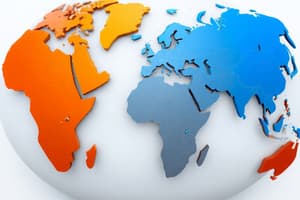Podcast
Questions and Answers
What period is generally defined as the contemporary era?
What period is generally defined as the contemporary era?
- After the end of World War II in 1945 to the present day (correct)
- Renaissance period in Italy
- Beginning of the Industrial Revolution in the 18th century
- Middle Ages in Europe
Which concept involves interaction and integration between people, companies, and governments worldwide?
Which concept involves interaction and integration between people, companies, and governments worldwide?
- Nationalism
- Industrialization
- Isolationism
- Globalization (correct)
What is a driving force in the contemporary world that has led to a more interconnected society?
What is a driving force in the contemporary world that has led to a more interconnected society?
- Protectionism
- Localization
- Isolationism
- Globalization (correct)
Which political system is based on rule by the people and has evolved significantly in the contemporary world?
Which political system is based on rule by the people and has evolved significantly in the contemporary world?
How has globalization impacted the economic disparity between countries?
How has globalization impacted the economic disparity between countries?
When did democracy gain importance in the modern era?
When did democracy gain importance in the modern era?
What is the most widely adopted political system in the world?
What is the most widely adopted political system in the world?
What has economic interdependence led to in the contemporary world?
What has economic interdependence led to in the contemporary world?
Which of the following is NOT a challenge in the contemporary world?
Which of the following is NOT a challenge in the contemporary world?
What shapes the future of the contemporary world?
What shapes the future of the contemporary world?
What is a key aspect of the contemporary world according to the text?
What is a key aspect of the contemporary world according to the text?
What does economic interdependence present in terms of challenges?
What does economic interdependence present in terms of challenges?
Flashcards are hidden until you start studying
Study Notes
Contemporary World: An Ever-Changing Mix of Social and Political Changes
The contemporary world is a dynamic blend of social, political, and technological changes. It is a period of both conflict and cooperation, of challenges and opportunities, and of rapid advancements and transformations. The contemporary era is generally defined as beginning after the end of World War II in 1945 and continuing to the present day. This period has seen significant developments in various fields, including globalization, democracy, economic interdependence, and international relations.
Globalization and Its Impact
Globalization, the process of interaction and integration between people, companies, and governments worldwide, has been a driving force in the contemporary world. It has led to the spread of ideas, values, and technologies across the globe, creating a more interconnected and globalized society. However, globalization also presents challenges. For example, while it can lead to economic growth and rising standards of living, it can also widen the gap between rich and poor countries, with the rich becoming richer while the poor become poorer.
Democracy and Its Evolution
Democracy, a political system based on rule by the people, has evolved significantly in the contemporary world. While it was first introduced by the ancient Greeks, it gained importance in the modern era with the adoption of the United States Constitution. Democracy continues to be the most widely adopted political system in the world, although its nature and effectiveness can vary greatly among countries.
Economic Interdependence and International Relations
The contemporary world is characterized by economic interdependence, with countries relying on one another for trade, investment, and technological cooperation. This interdependence has led to the rise of multinational corporations and the changing role of international boundaries. However, it also presents challenges, such as managing conflicts between countries with different economic interests and values.
Challenges and Opportunities in the Contemporary World
The contemporary world is marked by a range of challenges and opportunities. These include emerging technologies, healthcare, overpopulation, climate change, poverty, illiteracy, disease, and migration. How these challenges are addressed will shape the future of the contemporary world.
In conclusion, the contemporary world is a period of continuous change, marked by both challenges and opportunities. It is a time of globalization, democracy, economic interdependence, and international relations, and it presents a unique set of issues and opportunities for individuals, societies, and nations around the world.
Studying That Suits You
Use AI to generate personalized quizzes and flashcards to suit your learning preferences.




